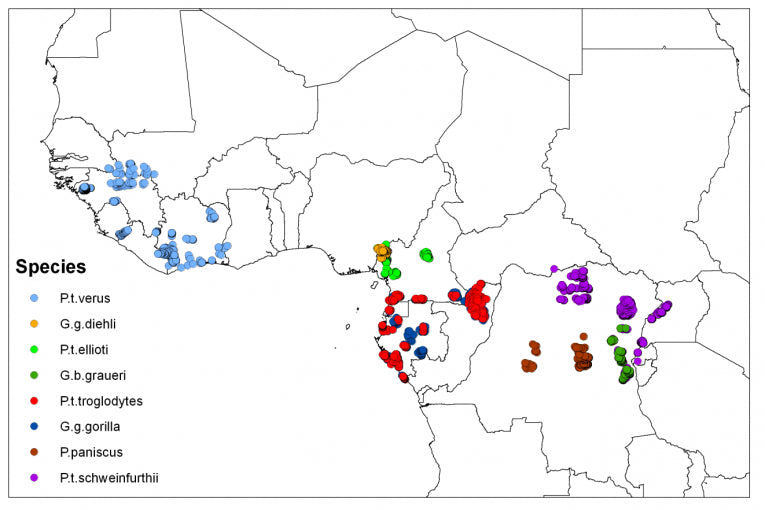Above: The present localities of the eight great ape species that were available at the time of the study, from the A.P.E.S. database and used as input for the ape habitat model. (names are given in English throughout the article's length; Pan troglodytes and subspecies are chimpanzee for example.)
After years of depredations ranging from their use for bushmeat to dwindling population and disease, the African apes are now in greater danger than ever, from loss of their various habitats. A huge group of scientists have collaborated to bring us a paper explaining just how little of their native patch is left. Human populations are naturally rising and forest exploitation, it needs hardly be said, increases in many varied and changing ways.
The journal, Diversity and Distributions, has published this extensive investigation into the whereabouts of suitable habitats for all the species. Jessica Junker of the Max Planck Institute in Leipzig leads the team, along with many other nationals from France, the US, Liberia, Belgium, DRC, UK, Gabon, Korea Cote d'Ivoire, Indonesia, Ghana, Cameroon and Italy.
The sad loss of Ymke Warren should be mentioned. In the words of Hjalmar Kuehl, from the Max Planck Institute, "Several studies either on a site or country level indicated already that African ape populations are under enormous pressure and in decline." Dr Kueh; continued by describing the enormous scope of the work.
"Many of the authors have spent years to collect the data used in this study under extremely difficult conditions with a lot of personal commitment." The interest shown in the scientific community to our closest "cousins" will hopefully be mirrored by the general public, especially in the nations involved, with habitat retrieval and preservation.

This family of bonobos can still be found in their natural habitat in one or two areas, such as this, the largest protected area of dense forest in Africa, in the Salonga region of the Democratic Republic of the Congo - Pan paniscus; Credit: © Shutterstock
Pan paniscus is the closely related bonobo (pigmy chimpanzee, to some). The species is very much confined nowadays, with areas in-between the reserves very much out of bounds for the different populations. This means interbreeding in the wild is nigh on impossible. Eastern gorillas (Gorilla beringei graueri) on the other hand have lost more than half of their habitat since the 1990s, while the rest of their species are just as badly affected (up to 59%).
Hunting is mainly a problem in West Africa, while in Central Africa, it is even more deadly, for the bushmeat trade. Wood, minerals and space are the other main demands of human activity. Despite that, some apes manage to survive near human settlement successfully. How will we survive without them? It remains to be seen how many we seem destined to lose in the wild.










